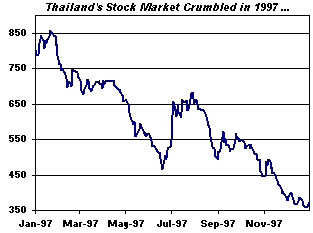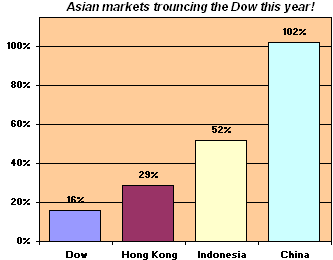A lesson from History Thailand's stock and currency market compared with 1997
Stock-Markets / Analysis & Strategy Dec 23, 2006 - 07:10 PM GMTNine years, five months, and twenty days ago, Thailand revalued its currency, the baht. That one small move ultimately brought down stock markets, currencies, and economies throughout Southeast Asia and the world.
Now, Thailand is in the news again — implementing capital controls on international investors. Those rules would lock up a chunk of foreign investors' funds for a year in an attempt to curb currency speculation. But the circumstances of this new situation couldn't be more different from those of 1997. Instead of being provoked by a strong U.S. currency, Thailand is reacting to a weak dollar. That speaks volumes about just how far the once-mighty greenback has fallen.
Today, I want to look back at the fateful days of the 1997 Asian contagion ... compare it to the current situation ... and, most importantly, explain what it means for your investments.
The Baht Took a Bath and Thailand's
Stock Market Dropped 55%
In the 1990s, Thailand ran a large current account deficit for years ... with few, if any, consequences. The country had no trouble attracting foreign capital. International banks, hedge funds, and other lenders were eager to shovel money its way. Domestic banks also ran amok on the credit front. They lent money for speculative real estate projects, stock purchases, and just about anything else, with little regard to risk.
But in the spring of 1997, whispers, rumors, and warnings started sweeping through the markets — Thailand's exports were slowing and its economy looked shakier. Slowly but surely, investors were looking elsewhere. Yet Thailand stubbornly kept the baht fixed to a basket of currencies, of which the dollar was the biggest component. Speculators saw opportunity and pounced. They placed massive bets that Thailand wouldn't be able to maintain the value of its currency. The country's central bank watched its currency reserves plummet. Policymakers fought hard, but they couldn't hold back the tide forever.
Finally, on July 2, 1997, all hell broke loose. In one fell swoop, Thailand gave up and allowed its currency to float. The baht immediately plunged almost 20% in value and interest rates surged.

Within a few weeks, the country's stock market was plunging. The Bangkok SET index ended the year with a whopping 55% loss!
Thailand's Pain Was Just the
Beginning of a Bigger Disaster
Many of Thailand's neighbors suffered from the same fundamental problems — overvalued currencies, extreme current account deficits, and massive real estate speculation. So soon enough, Thailand's “sneeze” was spreading an Asian contagion throughout the region:
- Indonesia's currency, the rupiah, lost 30% of its value.
- Hong Kong was forced to jack interest rates up to 300% to fight off speculative attacks.
- One by one, the dominoes fell in Malaysia ... the Philippines ... Singapore ... and eventually, South Korea.
And the U.S. wasn't immune, either. On October 27, 1997, the Dow Jones Industrial Average plunged 554 points — its biggest one-day point decline ever. Ultimately, the International Monetary Fund was forced to step in with bailout packages totaling $17 billion for Thailand ... $40 billion for Indonesia ... and a whopping $57 billion for South Korea. That's the biggest in history. Add it all up, and you can see that Thailand's minor currency move provoked one of the worst financial market crises in modern history.
Meanwhile, the U.S. dollar reigned supreme throughout. It proved to be a rock-solid store of value during those turbulent times. In fact, the broad U.S. Dollar index surged after Thailand's devaluation, finishing the year with a 13% gain.
Now, Times Sure Have Changed:
Asia Is Soaring While the U.S. Is Lagging
In 1997, investors believed the baht was dramatically overvalued, so they pulled their money out of Thailand by the boatload. But this time around, Thailand decided to implement its new capital controls because its economy is performing too well and attracting too much money. Foreign inflows are so great, in fact, that the baht has surged 16% against the dollar in 2006. That's a nine-year high! The country's exporters have been griping because such a strong currency makes their goods less competitive on world markets.
Another difference between now and 1997: Foreign stock markets have been surging throughout Asia, while U.S. shares have been lagging. Hong Kong's Hang Seng Index is up 29% year-to-date ... Indonesia's Jakarta Stock Price Index has surged 52% ... and China's Shanghai Stock Price Index has more than doubled. That compares with a 16% rise in the Dow.

True, Thai stocks initially got walloped when the new currency measure was announced. But they're already bouncing back ... and exchange-traded funds that track other foreign markets barely blinked! This time around, our economy is the one running the worst current account deficit in history. The U.S. deficit set a full-year record of $805 billion in 2005, almost six times the $141 billion owed in 1997. Heck, in the third quarter of 2006, our deficit hit an all-time quarterly high of $226 billion!
Plus, today, the U.S. dollar is the overvalued currency falling off a cliff. The U.S. dollar index, which measures the greenback against a basket of the world's currencies, topped out at 121.02 in 2001. It's now down about 31% since then. If it rounds out 2006 with a loss ... which is all but guaranteed at this point ... the greenback will have dropped four out of the past five years. And this time around, it's our public officials who are going around the world pleading for relief. As Larry told you yesterday, Treasury Secretary Henry Paulson, Fed Chairman Ben Bernanke, and several cabinet ministers just begged China to revalue its currency in order to boost exports and “save” American jobs.
What This Power Shift
Means for Your Investments
Do I think the U.S. dollar is going to plunge 20% in one day? No.
Do I think the Fed will have to push overnight rates to 300% to defend the buck? Of course not.
There are plenty of other differences between smaller Asian countries and the U.S., too.
But I simply can't ignore the echoes of 1997. And neither should you. Every day, the once-mighty dollar looks a lot more like the once-lowly Thai baht.
If we continue to screw over our foreign creditors and foreign investors, we can expect to see:
- More central bankers shifting their reserves out of dollars and into alternatives like the euro and gold.
- More inflation, as foreign producers of everything from oil to toys raise their prices to compensate for the loss in value of the dollars we're sending them for their goods. That could push interest rates higher.
- More gains for foreign stocks and bonds. As I told you in “ Buy American? Not in Bonds ,” U.S.-based investors can get a currency “kicker” by investing in overseas assets. Indeed, just this week, the Chinese stock market became the largest among all emerging markets, with no end in sight. For details on how to profit from the surge.
- More profit opportunities in 2007 than we've seen in decades — in ETFs and LEAPS options ... in China and Japan ... in gold, silver, oil and other natural resources.
Until next time,
Mike Larson
This investment news is brought to you by Money and Markets. Money and Markets is a free daily investment newsletter from Martin D. Weiss and Weiss Research analysts offering the latest investing news and financial insights for the stock market, including tips and advice on investing in gold, energy and oil. Dr. Weiss is a leader in the fields of investing, interest rates, financial safety and economic forecasting. To view archives or subscribe, visit http://www.MoneyandMarkets.com
NOTE - From time to time, The Market Oracle publishes articles from third parties. These articles do not necessarily express the viewpoints of The Market Oracle or its editorial team.© 2005-2022 http://www.MarketOracle.co.uk - The Market Oracle is a FREE Daily Financial Markets Analysis & Forecasting online publication.



